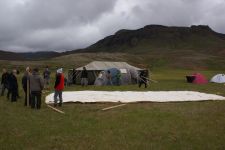
July 18th 2007 a number of Saving Iceland activists made a courteous -first- visit to the Reykjavik Energy geothermal power station (Hellisheidarvirkjun), at Hengill volcano, to ask questions about the expansion of the geothermal power plant to provide electricity to aluminium smelters (Source: EIB). It is striking, that although the expansion of the Rio Tinto ALCAN smelter in Hafnarfjordur has been rejected by referendum, and other smelter projects in the south west are not definite, and the current Icelandic government says to oppose more smelters, Hellisheidi is still being expanded by Reykjavik Energy – at a cost of a whopping 379.06 million dollars. The Icelandic people are again blackmailed: once the expansion is completed, this will force Iceland into more smelters because the electricity needs to be sold to get investments back. The expansion must be stopped.
The Hengill geothermal area is one of the largest and most active geothermal zones in Iceland, with over 112 km2 of unique geological landscape featuring warm pools, hot springs and bubbling mud pools. The area is culturally and historically fascinating, located below and on the slopes of the dramatic Hengill volcano where travellers on their way to Reykjavik and Þingvellir have traced the ancient Cairns since Iceland’s first settlement. Þingvellir national park and Alþingi, the most precious Icelandic cultural landmark, can be seen from Hengill across the stunning lake þingvallavatn and stands to be affected by the developments here.
Geothermal Electricity
In addition to the existing geothermal boreholes and power plants at Hellisheiði, Reykjavik Energy has declared plans to vastly expand the number of boreholes and power stations in order to produce electricity planned Aluminium smelters at Keflavik and Hvalfjordur (Century) and an expansion to the Rio Tinto / Alcan plant at Hafnarfjordur. The implications of this exploitation are far-reaching.
- Increased power generation means increased noise and industrial visual disturbance to this exceptionally rare and valuable landscape type.
- Extraction of underground fluids leads to changes in groundwater movements, commonly including drying of unique hot springs and geysers and pollution of pure subsurface spring water.
- Hot and toxic waste water is either disposed of by pumping it back into the borehole (as at Nesjavellir), commonly increasing the frequency of earthquakes in this very active fault zone, or it is pumped untreated into streams and lakes, wiping out valuable ecosystems as treatment is considered too expensive. The Northern end of lake þingvallavatn is already biologically dead in parts due to wastewater pumping and must be protected from more damage.
Green Energy?
RE and Landsvirkjun justify this tragedy under the guise of ‘green energy’, intended for the expansion of heavily polluting aluminium industry. The Aluminium industry is an environmental and social hazard from start to finish:
- Mining of bauxite (raw Aluminium) destroys vast areas of tropical forest in Australia and the Amazon.
- In the smelting countries, sulphur dioxide causes acid rain and potent greenhouse gases lead to climate change. 13 tons of CO2 are produced for every ton of aluminium.
- The production process results in far more tonnage of pollution than aluminium, including fine red silt containing radioactive elements which cause cancer and silicosis in the developing countries in which they are mined.
- Emissions of highly toxic fluorides poison fish and all other aquatic life.
- After smelting, the aluminium is used to build cars, cans and planes and 30% of production goes to the military. ALCOA use the blurb ‘lighter, faster, stronger’ to advertise tanks, missiles, and F16s used to kill and maim civilians in Iraq and other controversial conflicts.
- Smelters have a limited lifetime. They close after a few decades, leaving communities in disarray. This has happened in the US, in Suriname, Brazil, and many other countries. Geothermal plants are also limited in their lifespan. They are exhausted after a few decades, after which they need an unknown rest period.
Suggesting that Iceland has an ethical duty to sell all it’s energy possibilities, whether green or not, is an insult to our intelligence.
Change
In recent years the public consciousness against such damaging and outdated heavy industry has grown. In September 2006 15,000 people marched in Reykjavik and around the country as the exceptionally beautiful Karahnjukar highlands were finally and tragically drowned. For the third year, Icelandic and international activists have gathered in the wild of this incredible country to protest the blackening of this pure land by heavy industry. We welcome all those who share a love for nature and are willing to stand up against its destruction. Read More

